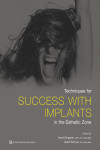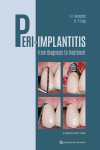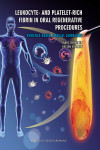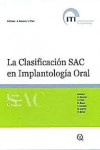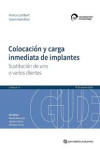BUILDING BETTER BONE A COMPREHENSIVE GUIDE TO GBR TECHNIQUES
Roberto Rossi
Datos técnicos
- ISBN 9788874920969
- Año Edición 2024
- Páginas 408
- Encuadernación Tapa Dura
- Idioma Inglés
Sinopsis
The idea for this book was conceived at a critical time for humanity, during the lockdown following the Covid 19 pandemic. An international group of fellow clinicians set out to create a book to analyze all aspects of a common problem in implant dentistry: the loss of one or more teeth, and the subsequent physiologic resorption of both hard and soft tissue. Defects resulting from tooth loss can be treated in several different ways, with similar but different surgical techniques, materials, and methods. GBR is an approach that has been around for over 30 years, during which time we have learnt its pros and cons. Understanding how to select the optimal GBR technique ensures reduced risks for patients and clinicians alike. This book is intended to be a "recipe manual" for how to help build better bone, and includes varied protocols representing the state of the art in modern dentistry, without commercial bias. The book is also enriched by 14 videos that provide detailed explanations of the techniques adopted, and each chapter illustrates expert recommendations for optimizing the techniques presented.
Índice
Chapter 01. Guidelines and Scientific Background of GBR
Chapter 02. Wound healing: from basic mechanisms to soft tissue healing in oral surgery
Chapter 03. Classification and Guidelines for Treatment of Bony and Soft Tissue Defects
Chapter 04. Fresh extraction socket management: thinking in and out of the box
Chapter 05. Osseodensification for ridge expansion: clinical protocols and case reports
Chapter 06. Resorbable and nonresorbable membranes
Chapter 07. Rationale for the use of autogenous grafts, alloplasts, and xenografts
Chapter 08. Autogenous Bone Grafting in the Posterior Edentulous Mandible with the Khoury Technique: Indications, Contraindications, and Limitations
Chapter 09. Innovative Autogenous Bone Grafting Techniques
Chapter 10. Use of heterologous lamina in the esthetic zone: site specific treatment options depending on site morphology
Chapter 11. Occlusive titanium barriers for GBR
Chapter 12. Cortical lamina xenogeneic bone membrane: indications, contraindications, and limitations
Chapter 13. Cortical lamina in horizontal and anterior defects: the multilayer technique
Chapter 14. Fibrinogen-Induced Regeneration Sealing Technique (F.I.R.S.T.)
Chapter 15. Use of cortical laminas for bone layering and bone-into-bone techniques
Chapter 16. Osteodistraction for ridge augmentation: principles, indications, and contraindications
Chapter 17. GBR for maxillofacial and congenital defects
Chapter 18. Digital vertical and horizontal bone block grafting
Chapter 19. Immune modulation with calcium phosphate alloplast. up-regulated, membrane free host bone regeneration
Chapter 20. Using digital dentistry to build soft and hard tissues for function and esthetics
Chapter 21. Evolution of xenogeneic bone membranes: flex cortical sheet
Chapter 22. Digitally assisted soft tissue and bone sculpting for PK1 (pink-free) full arch prosthesis
Chapter 23. Magnesium: the next generation of biomaterials in regenerative dentistry
Chapter 24. Oxidative stress and osteoimmunology: the two missing pieces of the oral osseointegration puzzle
Authors include:
Antonio Barone • Joseph Choukroun • Salvatore D’Amato • Peter J.M. Fairbairn • Edoardo Foce • Filippo Fontana • Vincenzo Foti • Howard Gluckman • Andrea Grassi • Arndt Happe • Salah Huwais • Giovanna Iezzi • Eugenio Longo • Michele Antonio Lopez • Hassan Maghaireh • Fabio Perret • Adriano Piattelli • Andrea Pilloni • Alessandro Pozzi • Lorena Rispoli • Roberto Rossi • Paul Leonhard Schuh • Giorgio Tabanella • Hannes Wachtel
Otros libros que te pueden interesar
- ¿Quiénes somos?
- Gastos de envío
- Política de privacidad
- Políticas de devolución y anulación
- Condiciones Generales de contratación
- Contacto
2025 © Vuestros Libros Siglo XXI | Desarrollo Web Factor Ideas






